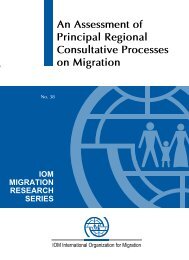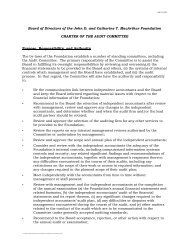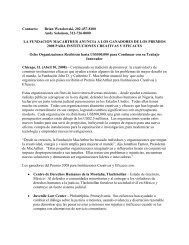A Global Compact on Learning - Brookings Institution
A Global Compact on Learning - Brookings Institution
A Global Compact on Learning - Brookings Institution
Create successful ePaper yourself
Turn your PDF publications into a flip-book with our unique Google optimized e-Paper software.
children’s earliest years are the foundati<strong>on</strong> for their<br />
physical and mental health, emoti<strong>on</strong>al security, and<br />
the development of competencies. 101 Nati<strong>on</strong>s should<br />
devote at least 0.5 percent to 1 percent of gross domestic<br />
product to parent and early childhood educati<strong>on</strong>.<br />
102 In particular, relying <strong>on</strong> all families to cover<br />
the costs through user fees is problematic in light of<br />
the evidence that children from the poorest households<br />
benefit the most from ECD interventi<strong>on</strong>s.<br />
Existing infrastructure should be utilized to deliver<br />
these services at a low cost. Parent and family support<br />
programs can be integrated into health services.<br />
Governments should also engage the private sector<br />
to support ECD programs, which often have a vested<br />
interest in healthier, more productive c<strong>on</strong>sumers.<br />
In additi<strong>on</strong> to c<strong>on</strong>tributi<strong>on</strong>s from the government<br />
(both nati<strong>on</strong>al and local), families, community and<br />
social organizati<strong>on</strong>s, the private sector, and internati<strong>on</strong>al<br />
organizati<strong>on</strong>s, <strong>on</strong>e new method for financing<br />
ECD is the development of microenterprise projects.<br />
Women (typically) who want to begin a home-based<br />
care center to earn an income receive seed funding<br />
and relevant training to ensure the quality of the<br />
service being provided to the children in their communities.<br />
Similarly, income-generating projects (i.e.,<br />
school-based gardens and handicrafts) can allocate a<br />
porti<strong>on</strong> of their income to the operati<strong>on</strong> of the center<br />
while participating parents earn additi<strong>on</strong>al income<br />
or reinvest the profit in expanding the project.<br />
Strategy 1B: Ensure That Girls and Boys<br />
Start School at an Appropriate Age<br />
In many developing countries, grade 1 classrooms<br />
are highly mixed with children as young as four and<br />
as old as eleven. Thus some children may be in a formal<br />
school setting at too young an age, which can be<br />
linked to the absence of ECD opportunities, while<br />
others may have started school too late, missing the<br />
opportunity for early learning with all its cumulative<br />
benefits. Both underage and overage students<br />
present additi<strong>on</strong>al challenges for teachers because<br />
they are at a different phase developmentally than<br />
the six- and seven-year-olds expected to be in grade<br />
1. According to a recent study, no educati<strong>on</strong> system<br />
with good participati<strong>on</strong> rates and high levels of<br />
achievement <strong>on</strong> internati<strong>on</strong>al achievement tests has<br />
a high age-in-grade dispersi<strong>on</strong>. Either dispersi<strong>on</strong><br />
should be reduced or carefully planned multigrade<br />
teaching and learning approaches should be used,<br />
such as modularized curricula, when a single class<br />
c<strong>on</strong>tains students from more than <strong>on</strong>e grade level. 103<br />
In additi<strong>on</strong>, when children enroll in school at a later<br />
age, the risks of repetiti<strong>on</strong> and dropping out are<br />
greater. 104 This leads to increased costs for both the<br />
family and society. Girls are at a particular dropout<br />
risk when they are not at grade-for-age because the<br />
pressures they face can change drastically <strong>on</strong>ce they<br />
hit puberty. If they have <strong>on</strong>ly reached grade 3 or 5<br />
before there is pressure to marry or work, learning<br />
outcomes will be far below expectati<strong>on</strong>s. For instance,<br />
a recent household survey in Senegal found<br />
that survival rates to grade 5 for children who started<br />
school two years late were 10 percentage points<br />
lower than for children starting <strong>on</strong> time. 105<br />
There is general agreement that early learning is<br />
highly effective. Children who lose that chance run<br />
the risk of never catching up with their more fortunate<br />
peers. In many developing countries, girls<br />
out-enroll boys for age-in-grade, meaning girls are<br />
more often than boys at the appropriate age for their<br />
grade, until they reach the age of fourteen to sixteen.<br />
Bey<strong>on</strong>d this age in Sub-Saharan Africa, boys almost<br />
invariably drop out less. Even when more girls than<br />
boys start school <strong>on</strong> time, girls may face increased<br />
risks from being in class with much older boys as<br />
they enter adolescence. Age-in-grade has been increasing<br />
more often than decreasing, and the poorest<br />
groups have experienced greater increases in age-ingrade<br />
in some countries. Household wealth remains<br />
the str<strong>on</strong>gest predictor of being overage in school. 106<br />
Therefore, addressing dispersi<strong>on</strong> in age-in-grade will<br />
<strong>on</strong>ly be possible by focusing <strong>on</strong> the poorest children<br />
and ensuring that they enroll at the appropriate age.<br />
Two main acti<strong>on</strong>s need to be taken to achieve Strategy<br />
1B:<br />
• Encourage <strong>on</strong>-time entry through public<br />
policies, campaigns, and tracking.<br />
• Develop and support multigrade and multiage<br />
teaching approaches.<br />
A <str<strong>on</strong>g>Global</str<strong>on</strong>g> Compa c t <strong>on</strong> <strong>Learning</strong>: Taking Acti<strong>on</strong> <strong>on</strong> Educat i o n in Developing Countries<br />
C e n t e r for Universal Educat i o n at <strong>Brookings</strong><br />
21






